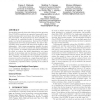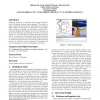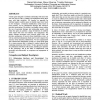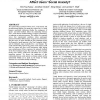ATAL
2008
Springer
14 years 1 months ago
2008
Springer
We develop a novel mechanism for coordinated, distributed multiagent planning. We consider problems stated as a collection of single-agent planning problems coupled by common soft...
ATAL
2008
Springer
14 years 1 months ago
2008
Springer
Decentralized partially observable Markov decision processes (Dec-POMDPs) constitute an expressive framework for multiagent planning under uncertainty, but solving them is provabl...
ATAL
2008
Springer
14 years 1 months ago
2008
Springer
We present ERIC, an affective embodied agent for realtime commentary in many domains. The underlying architecture is rulebased, generic, and lightweight
ATAL
2008
Springer
14 years 1 months ago
2008
Springer
The ability for an agent to reason under uncertainty is crucial for many planning applications, since an agent rarely has access to complete, error-free information about its envi...
ATAL
2008
Springer
14 years 1 months ago
2008
Springer
Language alignment is something that happens automatically in dialogues between human speakers. The ability to align is expected to increase the believability of virtual dialogue ...
ATAL
2008
Springer
14 years 1 months ago
2008
Springer
Virtual agents designed to establish relationships with more than one user must be able to identify and distinguish among those users with high reliability. We descr...
ATAL
2008
Springer
14 years 1 months ago
2008
Springer
Software maintenance is responsible for as much as two thirds of the cost of any software, and is consequently an important research area. In this paper we focus on the change pro...
ATAL
2008
Springer
14 years 1 months ago
2008
Springer
We explored the association between users' social anxiety and the interactional fidelity of an agent (also referred to as a virtual human), specifically addressing whether th...
ATAL
2008
Springer
14 years 1 months ago
2008
Springer
Researchers demand much from their embodied conversational agents (ECAs), requiring them to be both life-like, as well as responsive to events in an interactive setting. We find t...
ATAL
2008
Springer
14 years 1 months ago
2008
Springer
For the realistic simulation of embodied agents we need a model of emotion that represents both structural and dynamic aspects of emotional phenomena to serve as background suppor...




